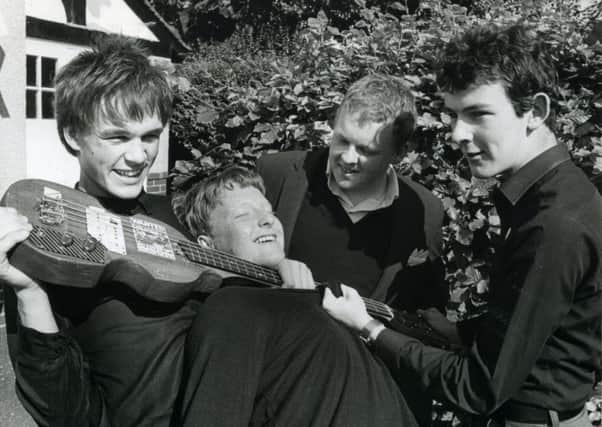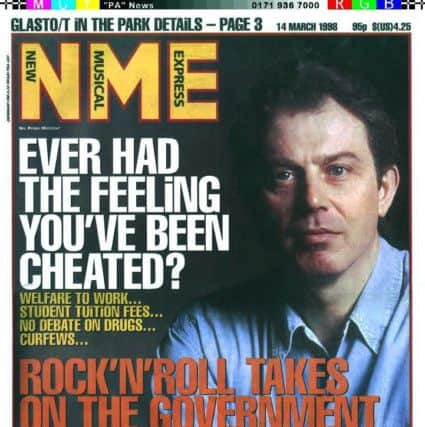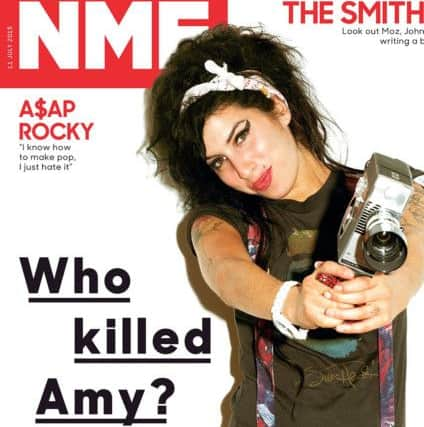'˜The NME was one of those music papers in the 70s that you would just buy'


Every Thursday a young John Robb would wander down to his local paper shop on Victoria Road in Cleveleys for one reason.
It was the day the NME came out. For him and many others, it was a rite of passage for a generation obsessed with music.
Advertisement
Hide AdAdvertisement
Hide AdAnd the NME – plus a handful of other music publications - was at the forefront of this fascination, introducing new music to an audience thirsty for information,in an era when print was king.


Today, it will release its final free print edition after 68 long years, citing rising production costs and a “tough” advertising market.
It will be “focusing investment on further expanding NME’s digital audience”, Time Inc said.
Punk musician Robb, now 56, was born in Fleetwood and grew up in Anchorsholme and later formed The Membranes in 1977 alongside Mark Tilton (guitar), Martyn Critchley (vocals) and Martin Kelly (drums). He went on to write for one of the NME’s rivals, Melody Maker, and Sounds.
He recalls those exciting Thursdays with relish.


Advertisement
Hide AdAdvertisement
Hide Ad“The NME was one those music papers in the 70s that you would just buy. It was out in the south on a Wednesday and the north on a Thursday – there’s a north/south divide for you. I’d go down to the paper shop on Victoria Road and get it.
“A lot of people would go in just to read the papers - they’d chuck you out when they realised!
“There were five music papers we’d get and spend all day reading them. That’s where you’d get all your information from if that’s what you were into. It was a portal into another world.
“The NME was big with the punk and post-punk era and it was right up my street.


Advertisement
Hide AdAdvertisement
Hide Ad“Like Sounds, they were fantastic at what they did and were really on the case and chronicled what was at the time a really vibrant northern scene. They had some great writers based in the north like Paul Morley and Jon Savage and you’d hang on their words. They could make or break every band.”
At its height, the NME claimed to sell 250,000 copies a week.
And when Robb, who writes for and runs the Louder Than War website, launched The Membranes in the late 70s, the support of the music press was instrumental in their success.
“It was really hard to get in the NME at the time, the competition was fierce, even just getting a gig listed.” he recalls.


Advertisement
Hide AdAdvertisement
Hide Ad“When we released Muscles it was Single of the Week in three of the four major music papers. It launched us and having influential writers tell thousands of readers to ‘go buy it’ was incredible for us.”
Ian Tilton, now 54, was childhood mates with Robb and brother of Mark Tilton, guitarist in The Membranes.
He became a photographer and worked extensively for Sounds and was commissioned by the NME for shoots.
Growing up on Anchorsholme Lane, the NME was too part of his weekly ritual.
Advertisement
Hide AdAdvertisement
Hide Ad“Blackpool was such a hotbed of great music at the time and if you were into that kind of music, the NME was essential,” says Ian, whose shot of an exhausted and tearful Kurt Cobain was hailed by Q Magazine as one of the six best rock photographs of all time.
“John and I grew up together and lived on the same road. I was younger than him and we’d end up working together in the music press.
“The NME was the one for me because they covered the bands I was into. One of us would buy it then we’d all read it. I was in Blackpool Vic a lot as a kid so that was a highlight every Thursday when it came out. We looked forward to it - and devoured it. If you were in a band and you got your gig in the NME it was a big deal.
“The music press was so important to the music industry at that time – if an NME journalist liked a song then you’d automatically have to go buy it.
Advertisement
Hide AdAdvertisement
Hide Ad“When I became a photographer, I worked for Sounds a lot but was commissioned to do some work for NME - not much though as you couldn’t work for both due to loyalty, the editors wouldn’t let you!”
While neither are surprised by the print product’s demise in a digital age, they say it would be cherished as part of the country’s rich musical history.
“It was so central to people’s lives for so long,” argues Robb. “But can you imagine having a conversation with an 18-year-old now where you’d tell them you had to wait a week to get information about your favourite band or who is playing where? They wouldn’t believe you.
“They can find a song or a gig listing in a second on their phones. Times have changed.
Advertisement
Hide AdAdvertisement
Hide Ad“It has staggered on but the big market is no longer there. But it will hold a lot of happy memories for a lot of people, I’m sure.”
“You need oil in an engine and with no oil it is going to seize up,” says Ian.
“People still go to gigs but there is less demand for expert opinion or analysis from the music press. It’s a shame there are few outlets to inform people and it’s all done on social media and via friends.
“The music industry has changed and the NME lasted longer than most.”
Advertisement
Hide AdAdvertisement
Hide AdThe magazine, which launched in 1952, went free in September 2015.
Paul Cheal, Time Inc UK group managing director, Music, said: “NME is one of the most iconic brands in British media and our move to free print has helped to propel the brand to its biggest ever audience on NME.com.
“The print re-invention has helped us to attract a range of cover stars that the previous paid-for magazine could only have dreamed of.
“At the same time, we have also faced increasing production costs and a very tough print advertising market.
Advertisement
Hide AdAdvertisement
Hide Ad“Unfortunately, we have now reached a point where the free weekly magazine is no longer financially viable. It is in the digital space where effort and investment will focus to secure a strong future for this famous brand.”
Publishers said NME would continue releasing special issues in print.